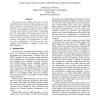124 search results - page 14 / 25 » Antichain Algorithms for Finite Automata |
COLT
1994
Springer
13 years 11 months ago
1994
Springer
We propose and analyze a distribution learning algorithm for variable memory length Markov processes. These processes can be described by a subclass of probabilistic nite automata...
VTS
1998
IEEE
13 years 11 months ago
1998
IEEE
This paper presents a BIST architecture for Finite State Machines that exploits Cellular Automata (CA) as pattern generators and signature analyzers. The main advantage of the pro...
FMSD
2008
13 years 7 months ago
2008
Timed automata are governed by an idealized semantics that assumes a perfectly precise behavior of the clocks. The traditional semantics is not robust because the slightest perturb...
GECCO
2005
Springer
14 years 26 days ago
2005
Springer
The iterated prisoner’s dilemma is a widely used computational model of cooperation and conflict. Many studies report emergent cooperation in populations of agents trained to p...
IJFCS
2008
13 years 7 months ago
2008
We consider the equivalence problem for labeled Markov chains (LMCs), where each state is labeled with an observation. Two LMCs are equivalent if every finite sequence of observat...

